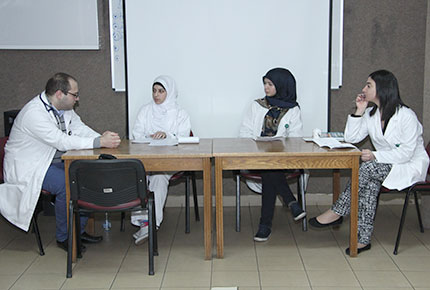IPE: Maximizing patient safety
LAU expands its offerings in health sciences interprofessional education through clinical and community-oriented activities to enhance patient care.

In addition to clinical activities, future community-oriented IPE activities will include informational sessions about osteoporosis (at ABC-Dbayeh, on March 19) and diet pills and weight loss (at the Byblos Souks, on April 2).
For five years now, Interprofessional Education (IPE) – whereby students from different disciplines come together to learn from each other’s experiences – has been a mandatory component of LAU’s curricula in nutrition, medicine, pharmacy, nursing and social work. In spring 2016, a new initiative will be launched to bring IPE out of the classroom, providing students with hands-on experience and benefiting the community at large.
“Students told us they would like to apply their IPE skills to real life,” said Nadine Zeeni, assistant professor of nutrition and coordinator of the IPE project. “So we put out a call and the faculty responded to it.” As a result, faculty from all five programs will lead students in a total of three clinical IPE activities this semester, combined with two events that will bring health information to the community in an interdisciplinary way.
According to Rita Doumit, assistant professor in the School of Nursing and lead faculty on the clinical IPE activity recently held at LAU Medical Center-Rizk Hospital, “studies have shown that collaborative practice is contributing to safer and more cost-effective and patient-centered care.” In fact, she went on, “interprofessional teamwork has helped decrease medical errors and improve patient satisfaction.”
For Mira Boutros, a student in LAU’s Nutrition and Dietetics-Coordinated Program who participated in one of the sessions at LAU Medical Center-Rizk Hospital, the welfare of the patient is the ultimate reason for engaging in IPE. “At the end of the day, we all care about the patient,” she said. “To avoid making mistakes and help the patient,” maximizing communication between the different professionals (nurses, doctors, pharmacists, nutritionists and social workers) involved is essential.
During the clinical sessions at LAU Medical Center-Rizk Hospital, students from the five disciplines teamed up to evaluate real-life patient cases. Boutros collaborated with four others on a surgery case during which “the surgery resident asked us, the nutritionists, what we could recommend as a diet for the patient,” she said. Zeina Mhanna, a nursing student, also experienced first-hand the importance of interprofessional cooperation for optimizing patient outcomes. “In our group, a discussion between the different professionals led us to figure out that the patient was getting the wrong dose of medication,” something that doctors might not catch on their own.
In addition to the February 12 session and an earlier clinical activity held at LAU Medical Center-Rizk Hospital on January 29, students will have the opportunity to work across disciplines at the Clinical Simulation Center on the Byblos campus later in the semester. Forthcoming community-oriented IPE activities will include informational sessions in which students will educate members of the public about osteoporosis (at ABC-Dbayeh, on March 19) and diet pills and weight loss (at the Byblos Souks, on April 2).
“This year is a pilot year for IPE outside the classroom,” said Zeeni. “But it is a long-term program, and we plan to add more sessions next year.”
More
Latest Stories
- A Cardiovascular Conference to Streamline National Expertise
- Aspiring Engineers Compete for Scholarships at LAU
- The School of Engineering Delivers Immersive Learning Experiences
- Consultants in the Making
- LAU Marks Rare Disease Day With a Call for Collaboration
- First Pulsed-Field Ablation in Lebanon Takes Place at the LAU Medical Center
- LAU New York Becomes a Degree-Granting Campus
- Health Science Students Win at the Annual Colorectal Awareness Walkathon

